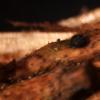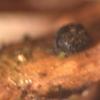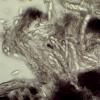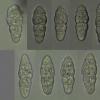
28-02-2026 14:43
A new refrence desired :Svanidze, T.V. (1984) Novy

27-02-2026 17:51
 Michel Hairaud
Michel Hairaud
Bonjour, Quelqu'un peut il me donner un conseil p

29-11-2024 21:47
Yanick BOULANGERBonjourJ'avais un deuxième échantillon moins mat

27-02-2026 16:17
 Mathias Hass
Mathias Hass
Hi, Found this on Betula, rather fresh fallen twi

27-02-2026 12:56
Åge OterhalsFound on fallen cones of Pinus sylvestris in midle

27-02-2026 11:21
 Yannick Mourgues
Yannick Mourgues
Hi to all. Here is a specie that can may be relat
is this Hysterobrevium smilacis?
Chris Yeates,
19-07-2012 16:46
 I struggled for a long time with this before "the penny dropped" - the shape of the ascoma being very short; this was a solitary pseudothecium on a fallen twig of Picea abies (non-native in Britain); ascospores 21.2-26.2 x 8.3-9.1µm; I have run it through Boehm's key and arrive at Hysterobrevium smilacis; comparison with Alain's http://www.ascofrance.com/search_recolte/2649? shows very similar ascospores.
I struggled for a long time with this before "the penny dropped" - the shape of the ascoma being very short; this was a solitary pseudothecium on a fallen twig of Picea abies (non-native in Britain); ascospores 21.2-26.2 x 8.3-9.1µm; I have run it through Boehm's key and arrive at Hysterobrevium smilacis; comparison with Alain's http://www.ascofrance.com/search_recolte/2649? shows very similar ascospores.My only reservation is the substrate - I can see that this taxon is highly plurivorous, but it has not been recorded (as far a I can see) on a Gymnosperm in Britain. Is that a problem?
Cordialement
Chris
J'ai lutté pendant longtemps avec cela avant «ça a fait tilt», la forme de l'ascoma étant très courte?, ce qui était un pseudothèce solitaire sur une brindille tombée de Picea abies (non-natif de Grande-Bretagne); ascospores de 21,2-26,2 x 8,3-9.1?m. Je l'ai parcouru le clé de Boehm et arriver à Hysterobrevium smilacis; comparaison avec http://www.ascofrance.com/search_recolte/2649 d'Alain ?montre ascospores très similaires.
Ma seule réserve est le substrat - Je vois que ce taxon est très «?plurivorous»?, mais il n'a pas été enregistrée (d'aussi loin que je peux voir) sur un gymnosperme en Grande-Bretagne. Est-ce un problème?
PS how do you say «plurivorous» in French?
Hans-Otto Baral,
19-07-2012 17:40

Re : is this Hysterobrevium smilacis?
From microscopy I actually do not see any difference. Gloniopsis smilacis is the same. I was aware of Hysterobrevium mori (previously Hysterographium) but not this combination.
The features of these genera are not clear to me, Boehm's key stresses only spore characters (mainly size). Seems mainly molecularly founded.
Zotto
The features of these genera are not clear to me, Boehm's key stresses only spore characters (mainly size). Seems mainly molecularly founded.
Zotto
Chris Yeates,
19-07-2012 17:52

Re : is this Hysterobrevium smilacis?
Alain GARDIENNET,
19-07-2012 22:38
Re : is this Hysterobrevium smilacis?
Hi Chris,
No problem for Hysterobrevium smilacis, typical ascospores. I have seen it on many different hosts (more than 15), including Pinus (Pinus pinaster and Pinus sylvestris). Why not Picea ?
Alain
Chris Yeates,
19-07-2012 22:50

Re : is this Hysterobrevium smilacis?
Merci beaucoup, Alain
Amitiés
Chris
Amitiés
Chris



